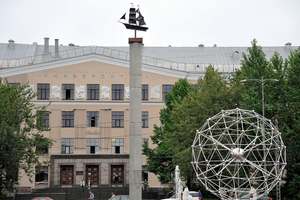PetrSU scientists and specialists from Norway and Finland held the first working meeting on an international grant
On February 23, PetrSU scientists and specialists from Norway and Finland held the first working meeting on an international grant.
In the large and structurally complex Arctic, the micro-region of the Barents Sea, called the Euro-Arctic region, stands out. In terms of its physical and geographical characteristics, the Euro-Arctic zone appears to be promising for the development of infrastructure cross-border projects. It is here that the Kolarctic CBC program was created and is successfully operating, which is a financial instrument to support cooperation between the northern regions of Finland, Sweden, Norway and Northwest Russia.
On February 23, PetrSU scientists and specialists from Norway and Finland held the first workshop on the supported international grant Kolarctic – project 5004 “Analysis of gaps and barriers in the conservation of coastal wetlands of the Euro-Arctic”.
The meeting was attended by members of the working team – A.I. Popov, (OOO NTP “Rubus”), S.А. Uvarov (WWF Barents Sea Branch), L.A. Sergienko (Doctor of Biological Sciences, Professor of the Petrozavodsk State University), T.Yu. Minaeva, (Candidate of Biological Sciences, Senior Researcher at the Center for the Preservation and Restoration of Bog Ecosystems of the Branch of ILAN RAS), specialists from Norway – Paul E. Renaud, Alexei Bambulyak, Benjamin Merkel, (Akvaplan-niva AS), Finland – Outi Maria Laatikainen (Kajaani University of Applied Sciences), Yulia Korshunova – head of the Russian office of Kolarctic (Murmansk).
The online meeting touched upon the main issues to be solved in 1 year of the mini-project – environmental problems and barriers to the conservation and sustainable use of coastal ecosystems in the Barents Region, analysis of gaps in available information for creating a monitoring system for coastal wetlands, testing of methodological and technical approaches to monitoring and assessing the state of coastal wetlands in the Pechora Bay of the Barents Sea, visualization and organization of the results of assessing the information state.
The discussion was very fruitful. The project participants agreed on regular meetings on the project – once every two weeks. It was decided to organize the next meeting on March 8th.

